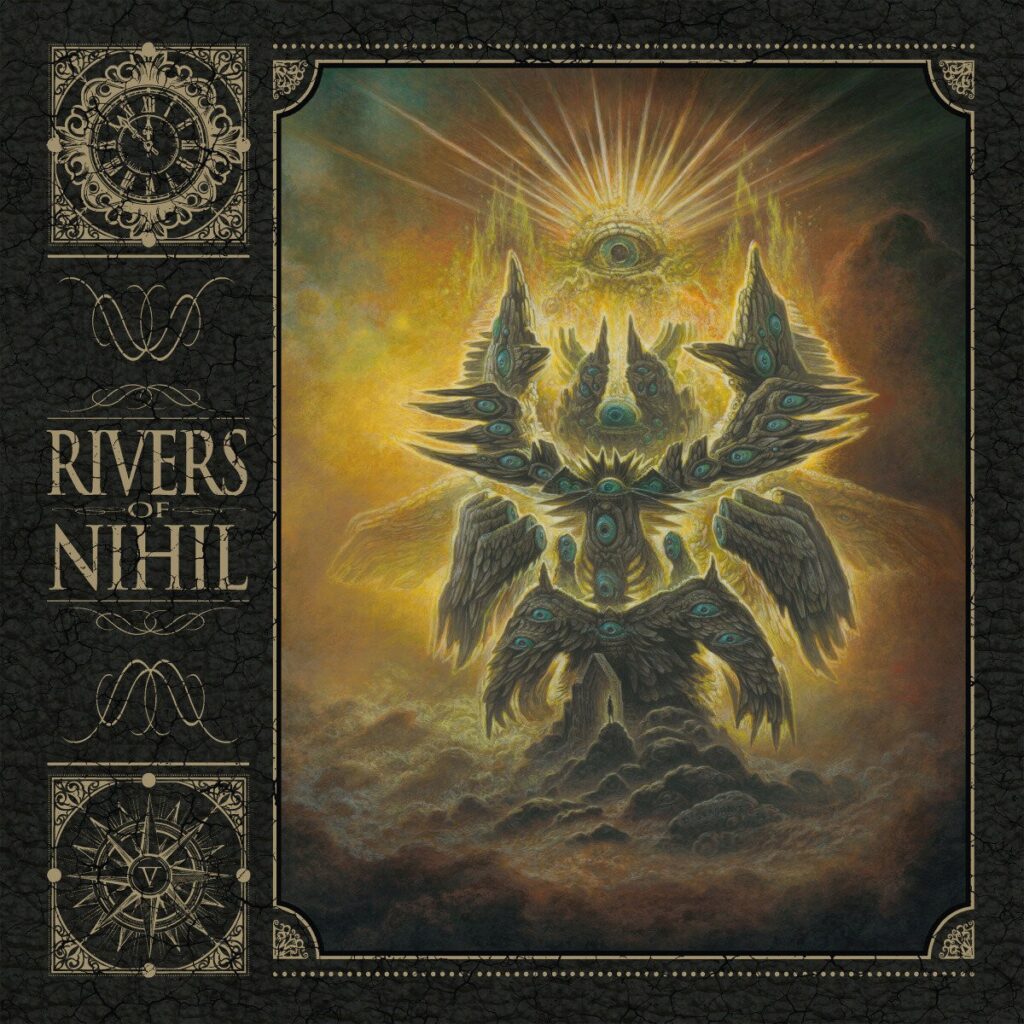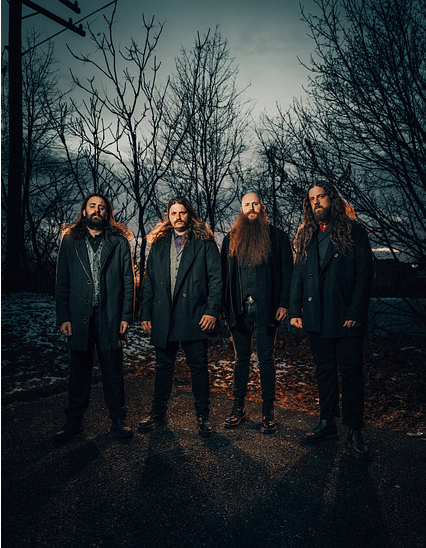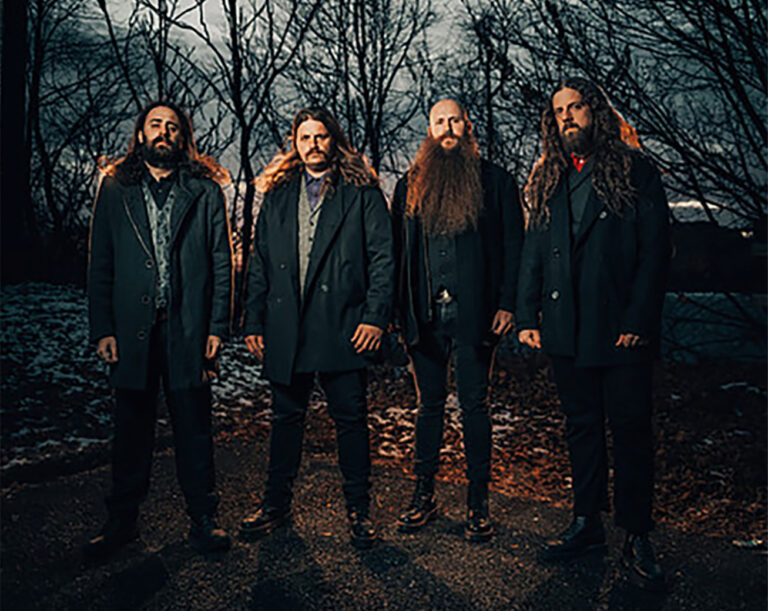We caught up with death metallers Rivers Of Nihil to talk about their first album without a seasonal theme, how they balance their heavy and proggy sides within the band’s writing process, and the advantages of air conditioning.
Your self-titled album comes after you finished your four-season quadrilogy, and I just wanted to ask you a little bit about the approach. Did you find not having a season in mind for that particular record in any way freeing at all? How did you find not having that framework to work with?
Adam: “It’s a little like working without a net because the seasons were a thing that we could always, when we hit some kind of roadblock, just go back to that thing and recall some kind of feeling from that. But now, without that, it just had to be more specific.”
Andy, what’s your take? You have come over from Black Crown Initiate, and this is your first album with the band. Of course, you worked with the guys previously, so what was your insight for taking part in the self-titled record?
Andy: “As far as the workflow on the new album, I contributed some musical ideas, and we wrote some songs together with that. Vocal-wise, Adam writes all the lyrics, and I contributed melody-wise to vocals and stuff. So we worked with a great vocal producer, Grant McFarland. So it’s pretty much a collaborative effort.”
Regarding lyrics, Adam, how do you convey your ideas to Andy and Jared when he’s doing additional vocals, and how do you get across what you are hearing in your head for them?
Adam: “It depends, I guess, on the specific idea, but a lot of the time I try not to be too married to any specific idea that I have. I’ll get in there, in the booth, and I’ll do some kind of rough take of what I think, roughly, the pattern and the melody would sound like. And then when the guys get in and try to do their thing over it, if it’s a little different than what I had in mind… But sometimes it will sound better – it’s a pretty open situation where we all kind of just go back and forth until we come up with something that we’re like, we all sit back and go like, “Yeah, that’s it, that’s the one”.
Andy: “It’s not like when you hear bands screaming at each other and beating each other up in the studio and stuff. It’s not like that at all. It’s pretty low-key, and we try to come up with the best result.”
Adam: “Yeah, we’re just always trying to make the best thing that we can. I think we all have similar ideas as to what that is, so there’s not a lot of butting heads. It’s usually like, when something cool happens, we’re all like, “Yeah, that’s it!”
Andy: “I mean, it’s like if you have an idea, and no one likes it, you can have another idea. It’s fine – it’s not the end of the world!”
That’s good – a nice collaborative effort. It marks the start of a new era for the band, obviously reaching the end of the four-album cycle and the various lineup changes, so going into the record, what were the goals? What was the mindset and the things that you wanted to achieve with it?
Adam: “I think we wanted to sharpen the whole idea of the band and the sound a little bit, instead of just throwing everything aside and going for something totally different. Because we’ve all been doing this for so long now that we all know what we’re all specifically good at. We were just trying to write a record that showcases each member’s talents in the best light possible, while making songs that are memorable and fun, and songs you want to listen to again.”
Andy: “Concise arrangements.”
That neatly brings me to my next point. For years, the band has done the tech-death thing, and you also have a lot of your prog elements: bits of post-rock like Explosions In The Sky-type passages, and saxophone, of course. When you are writing, at what point do you decide this part needs something proggier, or this part needs something heavier? And then, how do you go about, like what you said,, Andy, making it a concise arrangement? How do you keep that nice and tight?
Adam: “Well, usually that stuff starts to happen early on in the process when Brody is demoing riffs, putting song ideas together. Towards the beginning of the writing process, he’ll write small snippets of ideas for songs, and we’ll kind of go back and forth, and discuss and meditate on them. He’ll get some more inspiration and build on a thing. Sometimes, for this one, we kind of initially were like, “Let’s not write anything over 4.5 minutes”, which is a rule that we broke, but it was a good starting spot. We weren’t churning out any nine-minute songs or anything like that this time.
I think we wanted to make the songs as re-listenable as possible. I want to have that thing where the chorus hits and you get a vibe, and then you want to listen to it again.”
As mentioned before regarding the post-rock and more proggy aspects of the band, much of the atmosphere that tends to generate is quite emotive and feels very emotional. Would you say that is an important part of your music? The emotional pull for it?
Andy: “Emotion? I mean, emotion is the whole thing. If music does not evoke any type of emotion, it is not effective music.”
Adam: “As an extreme metal band, we try to keep the emotional spectrum a little more open than would be typical within death metal and stuff like that. Where that is focused on anger and just our negativity, I feel like we try to open it up a little bit more than that and try to make it feel more human.”

Yeah, I feel like songs like ‘The Logical End’ on the latest record and going back to things like ‘Monarchy’ with ‘Circles In The Sky’ had quite a nice, big, emotional conclusion to it all, so I can see where you are coming from in that respect. How do you try to translate that live?
Adam: “I think our thing live is just to make sure that we are all doing the material as much justice as possible. We all take what we do individually, sonically, very seriously. We tend to hold one another accountable in a positive way. We work together to make the sound meet fan expectations, and filter that through our own expectations of what we expect when we see bands that we like and what we want to see.”
You’re currently in the midst of a European tour. First off, how’s that going? Also, how do you transfer your approach from playing smaller venues to festival venues?
Andy: “Smaller venues are very different. It’s a cliché, but it’s true; it’s more intimate. You have more of a cyclical transmission of energy between the crowd and the band. I think that our band specifically thrives in that environment very well. We love the festivals as well, but you don’t get that so much. That being said, I think it’s been going pretty well so far. We’ve had a lot of fun at the club shows and the festival shows. It’s just so damn hot over here!”
It normally isn’t!
Andy: “Yeah, you say that every time, but it always is!”
You’ve got a South American tour that’s going to take place in 2026. Can you tell us a little more about what else is in store for the band in 2026?
Adam: “Well, we can say that North America will be seeing more of us before the end of the year. Can’t say too much more about that right now. Then we’ll be hitting some other parts of the world next year as well. And yeah, looking forward to building on that.”
Good luck with the tours next year! Of course, the self-titled album has only just come out, but have you given any thought to future Rivers Of Nihil? What might you do next?
Adam: “Yeah, we’re always thinking about the next step, always. Always building little things and trying to round out ideas. But it gets tough when you just put a record out, you’re touring on it, and you’re still living in the moment of that record. But yeah, we’re as excited to continue the story as hopefully the fans are to hear that story.”
Thank you both very much for taking the time to talk to us – it’s very much appreciated. Last question, is there anything that you’d like to say to your fans and to the Devolution Readers?
Adam: “Just thank you. It really puts it into perspective when you come to these festivals, just how many bands you can choose to listen to as a fan of this kind of music. So if you have given us any time, thought, bought a shirt, or listened to an interview from us – thank you. And thank you. We know you have endless options, so thanks for hanging out with us. We hope you continue to do so.”
Andy: “And I have an idea: it’s called air conditioning. What you do is…”
Adam: “You condition the air!”
Andy: “You condition the air to be cooler than it actually would be naturally. And it provides relief for everyone in that area. We can talk more about it after the interview. I’m working on the patent…”
https://www.facebook.com/riversofnihil
Interview By Lee Carter
Band Photo: Mike Truehart



